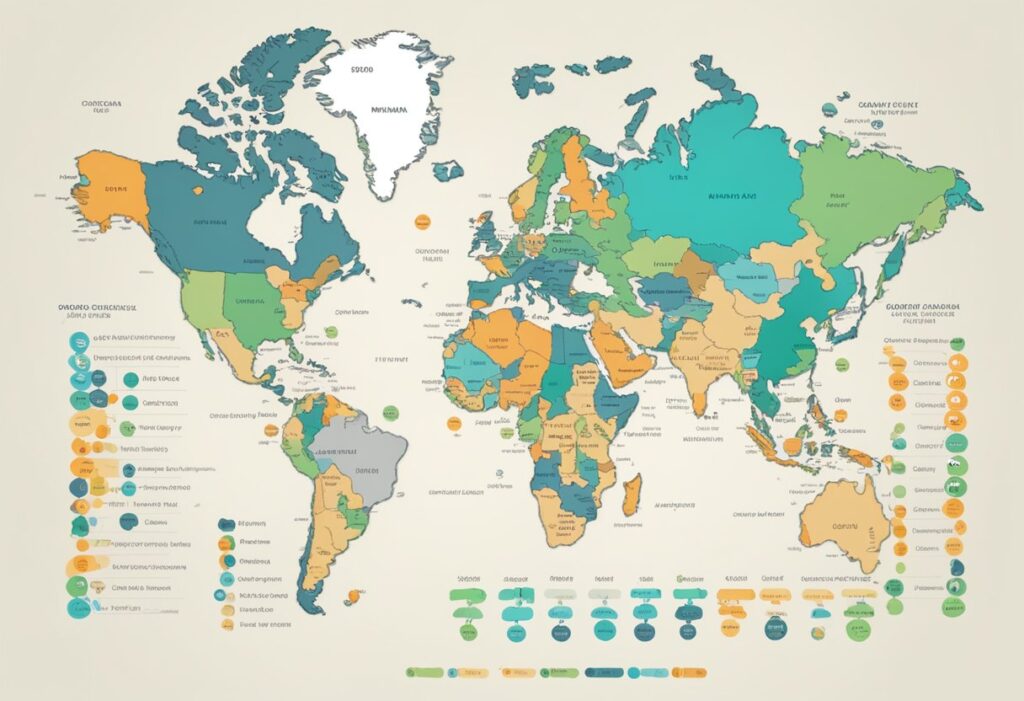Diving into a career as a product manager, you might wonder if the compensation aligns with the diverse responsibilities of the role. As the orchestrator of a product’s journey from conception to launch, a product manager’s pay reflects the strategic value they add to a company. The role necessitates a blend of technical expertise, business acumen, and leadership qualities, all of which contribute to product success—and potentially to a more generous paycheck.

Product managers indeed earn attractive salaries, often surpassing the average income in various industries. Numbers suggest a comfortable financial reward for the expertise that product managers bring to their teams.
As you continue reading, you’ll gain insights into how factors like industry, experience, and location impact a product manager’s salary. We’ll explore diverse salary statistics, unpack the elements contributing to their compensation, and highlight potential career growth opportunities within the field. This knowledge can help you navigate your own career path, whether you’re just starting out or looking to advance.
Product Manager Role and Responsibilities

In your role as a product manager, you’re pivotal in charting the product’s journey from concept to market. Here, we explore how you lead the effort to envision, build, and collaborate on products.
Defining the Vision and Strategy
Your first step is crafting a compelling vision for the product. You’re tasked with synthesizing market trends, customer feedback, and the company’s goals to outline a cohesive strategy. This roadmap guides all future product development, ensuring that your team’s work aligns with business objectives. It’s a significant responsibility, as your vision sets the tone for the product’s lifecycle.
Leading Product Development
As a product manager, you wear many hats during the product development process. You’re essentially the project’s captain, steering the course and making pivotal decisions. Much of your time is spent leading cross-functional teams, which includes designers and developers. Your leadership is not just about being in charge but also about inspiring your team to build a product that’s both functional and innovative.
Collaborating with Departments
The breadth of your responsibilities extends to frequent collaboration with various departments, including marketing, sales, and customer support. Communication is your superpower, enabling you to bridge the gap between diverse groups and stakeholders. Through effective dialogue and negotiation, you ensure all parties are aligned with the product’s direction and milestones. Your capacity to foster interdepartmental harmony can make or break the product’s success.
Compensation Factors for Product Managers

When you’re assessing a product manager’s salary, several key factors play pivotal roles. These factors interplay to determine how much you can earn in this dynamic field.
Experience and Seniority
Experience is a significant factor—initially, you may start with a salary reflective of an associate product manager. With years dedicated to mastering your craft, your compensation can scale accordingly. For instance, a product manager with a few years in the field often sees their earnings increase as their experience and responsibilities grow.
Company and Industry
The company and industry you’re part of also heavily influence your paycheck. Thriving sectors like technology or finance may offer higher salaries and benefits such as equity or stock options. High-revenue firms tend to reward their product managers more handsomely, recognizing the critical role they play in product success.
Location and Cost of Living
Your geographical location can drastically affect your product manager salary due to the cost of living variances. Cities with higher living costs generally offer higher salaries to offset expenses. For example, product managers in bustling tech hubs may receive salaries that well exceed the national average.
Education and Certifications
Finally, your education and certifications can enhance your earning potential. A well-regarded MBA or industry-recognized certificates can set you apart in the job market. These qualifications often translate into better offers and negotiation leverage, including improved senior product manager salaries.
Product Management Career Path

In the dynamic world of product management, climbing the career ladder involves a combination of skill enhancement, strategic specialization, and leadership acumen. Your journey could take you from an entry-level role to the top echelons of product leadership.
From Associate to Chief Product Officer
Starting as an Associate Product Manager, you are at the initial rung of the ladder, where you learn the ropes of managing products and collaborate with various teams. As you demonstrate your ability to handle increased responsibility, you may progress to roles such as Product Manager and Senior Product Manager, each with its own set of challenges and rewards, often with a significant salary bump.
Next in line might be the Director of Product Management where strategic decision-making becomes your core focus. Climbing higher, you may reach the position of VP of Product Management, which involves a broader scope of responsibility, including oversight of multiple product lines and leading larger teams. Finally, at the pinnacle sits the Chief Product Officer (CPO), where your vision shapes the entire product strategy of a company.
Skill Development and Advancement
Skill progression is key as you navigate through each seniority level. Initially, your focus is on mastering core competencies such as market analysis, user experience, and agile methodologies. As you advance, you’ll need to refine your strategic thinking and leadership skills, essential for steering product teams and influencing stakeholders.
Expanding your expertise in areas such as data analytics, financial acumen, and user behavior can boost your ability to make informed decisions. Moreover, staying abreast of technological trends helps you to lead from the front and fosters growth within your role.
Specialization and Leadership
At higher levels, you might choose to specialize in particular areas of product management, like product lifecycle management or go-to-market strategies. This allows you to become an expert in a niche area, offering tremendous value to your organization.
Leadership, however, transcends specialization. It’s about inspiring teams, setting a compelling product vision, and communicating effectively across all departments. Your ability to lead is often what distinguishes standout product managers who are capable of shaping the product landscape within their organizations.
Geographical Salary Variations
You’ll notice that where you live can substantially influence how much you earn as a product manager. Not all cities and countries compensate equally, so it’s important to be aware of these differences.

United States Pay Scales
In the United States, salaries for product managers can vary widely, reflecting the country’s diverse economic landscape. In tech hubs like Silicon Valley and San Francisco, you can expect compensation to be on the higher end. For instance, it’s not uncommon for product managers in San Francisco to have salaries that extend well beyond $200,000. Other cities like New York and Boston also rank high on the pay scale, complementing their reputations as bustling hubs for commerce and innovation.
Moving away from the bustling West Coast, you might see a different but still competitive salary range. In Seattle, home of tech giants, product manager salaries also impress. Across the country in Chicago, Dallas, and Atlanta, the numbers remain robust but are typically not as high as their coastal counterparts. However, lower living costs in these areas could mean that your paycheck goes further.
Global Salary Comparisons
When you look beyond the United States, salaries fluctuate even more due to various economic factors. In Europe, places like London and Ireland offer attractive pay that competes with some US cities. However, salaries in other European cities, while still substantial, might not always match those in the States.
Australia continues to grow as a significant player in product management salaries, with salaries in major cities like Sydney potentially matching those in many US locations. Additionally, countries like Switzerland and New Zealand are known for offering competitive salaries, especially when weighing in the quality of life and other benefits. On the other hand, cities on the UK‘s periphery, may offer slightly less but are known for excellent work-life balances—a factor you might value highly.
Navigating Product Manager Compensation

As you consider the product manager role, understanding the complexities of compensation will arm you with confidence in negotiations for every part of the offer.
Negotiating Salary and Benefits
Your ability to negotiate effectively can make a significant difference in your compensation package. Before entering negotiations, research the average salaries for comparable positions on platforms like Glassdoor. Remember, your skills in prioritizing, planning, and problem-solving enhance your value and should be part of your pitch. Juxtapose your business acumen and strategic function contributions against market norms to argue for higher compensation. If you’re eyeing a role at a company like Netflix, ensure your knowledge of their user experience (UX) needs and the specific strategic functions you’ll fulfill are clear. Create a plan that proves your potential for success and how it justifies your salary requests.
Benefits are crucial, too. They include health, dental, vision insurance, retirement plans, and sometimes stock options. Consider the entire package; sometimes, strong benefits may offset a lower base salary.
Understanding Offer Components
The job offer you receive will likely consist of several components:
- Base Salary: The core of your income.
- Bonus Structure: Often tied to performance and company success.
- Equity: Shares or stock options, which can be particularly lucrative in the long term.
- Benefits: Health insurance and other perks like wellness programs.
Each of these components plays a role in your overall compensation. Align your understanding of the offer with clear job descriptions, making note of prioritizing which components matter most to you. Considering certifications, like becoming a Certified Product Manager, may also play into your long-term earning potential. Keep in mind, negotiations aren’t just about salary. Flexibility, remote work options, and professional development opportunities can be part of your compensation strategy too.
Conclusion

The earnings for product managers are indeed competitive. With an average salary in the U.S. around $127,192, you’re likely to be well-compensated. This figure varies by experience and location. It’s clear that your initial years in associate roles equip you with valuable skills that can escalate your earnings considerably.
In comparison to other professions, the role of a product manager generally offers a remarkable financial reward. For instance, within the Australian market, product managers can expect a significant uplift in their average salary, with Canberra boasting impressive numbers.
Should you climb the career ladder, the prospects grow even brighter. The leap to a VP of Product often comes with a substantial hike in earnings, with the potential for bonuses to bolster your income even further. You’ll find VPs of Product earning on average around $331,301 a year, highlighting
